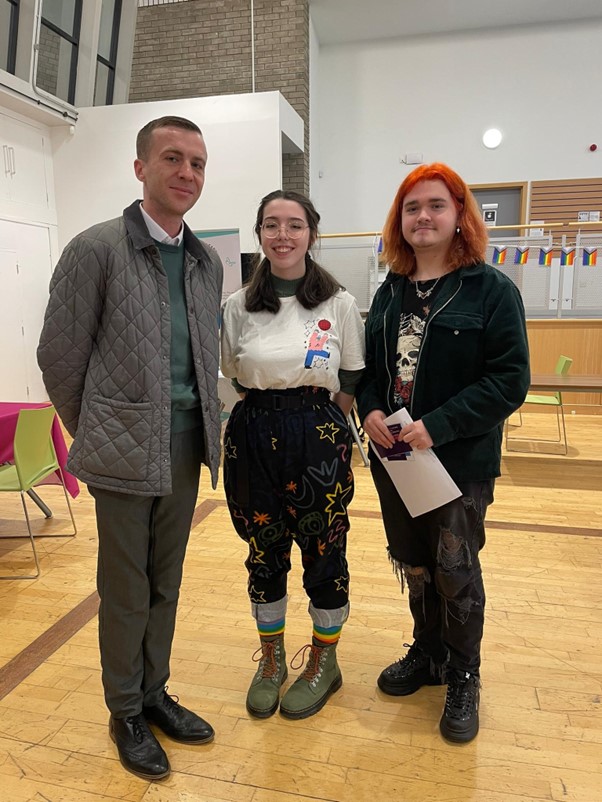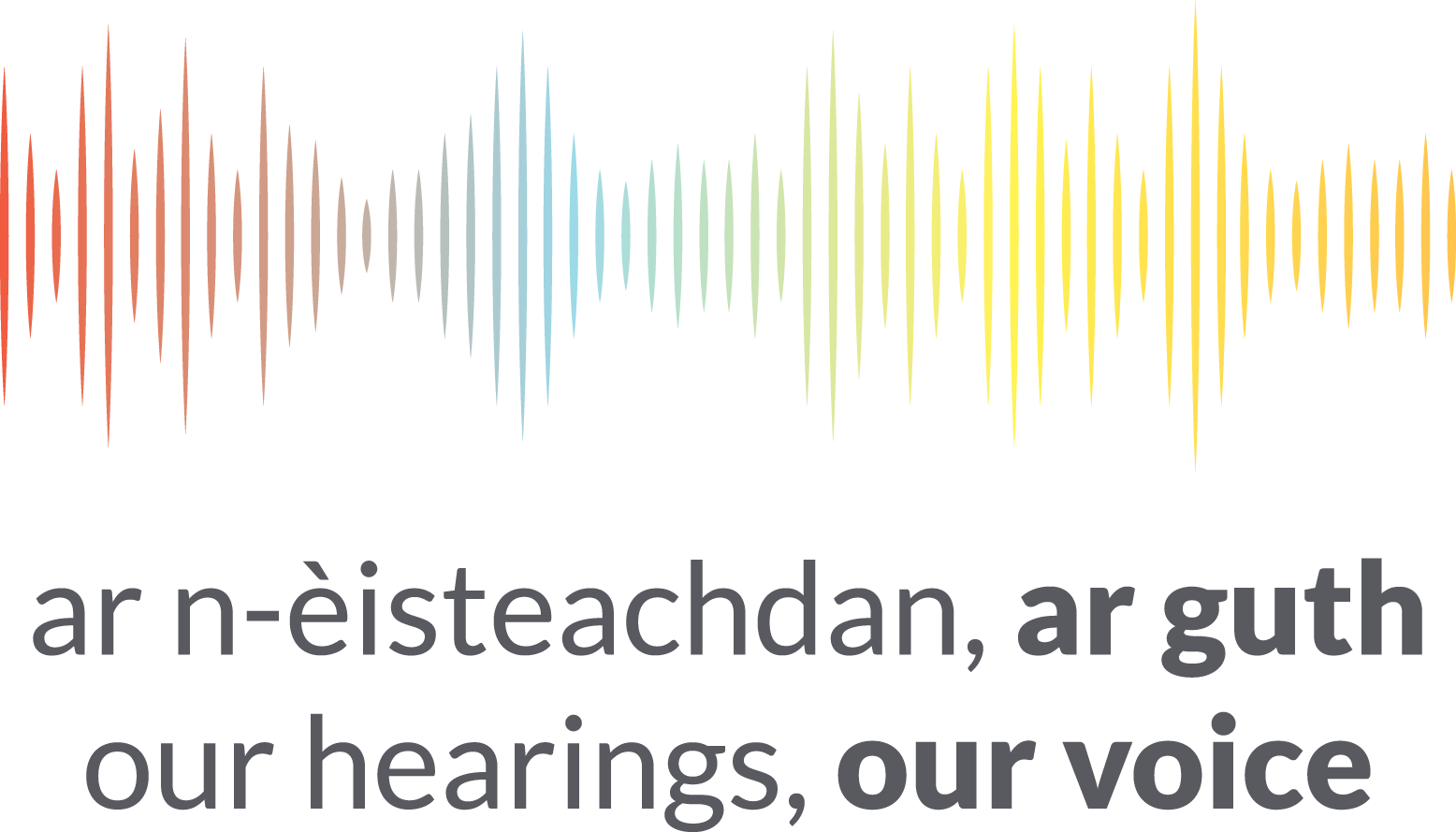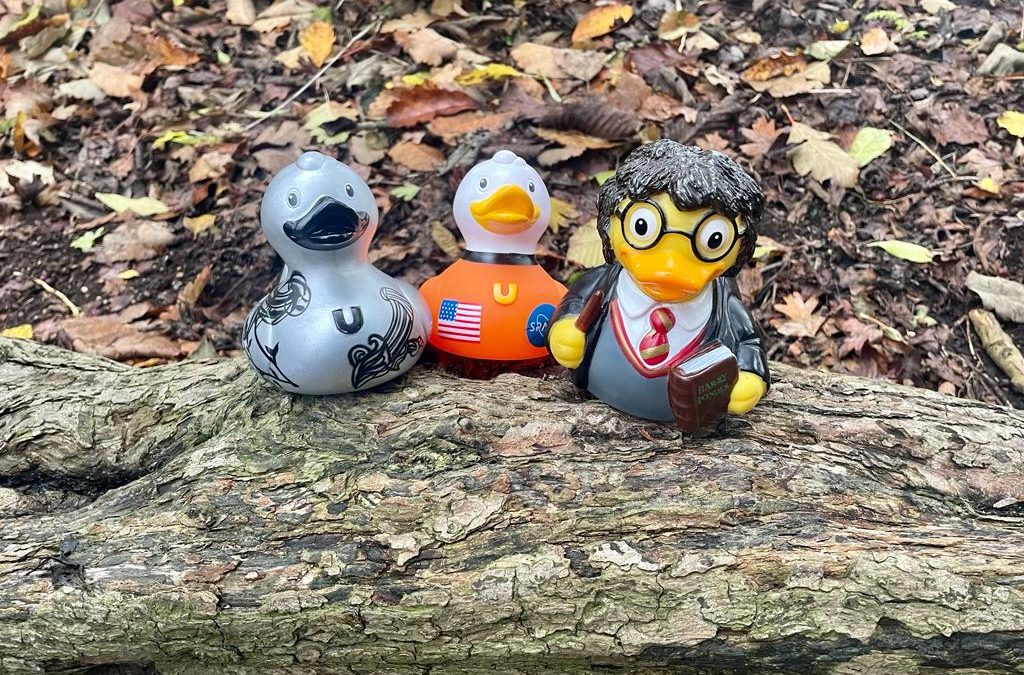OHOV Board Members Achilles and Ciara were recently at a Keeping The Promise event at Glasgow Clyde College delivering a workshop on changing the language of care and Children’s Hearings.
Before their workshop, they listened to Thomas Carlton sharing his work on the Independent Care Review and as Implementation Lead at Promise Scotland. They LOVED what he had to say and couldn’t wait to interview him for our website.
Here’s a sneak preview of the interview before the next edition of VOICE comes out in the spring…
Ciara: What do you do to relax or have fun?
Thomas: This question’s given me a wee chuckle, because I think that I’m very boring and I feel quite old thinking about what the former Thomas would’ve thought I’d be doing in my early 30’s. In my 20’s I would’ve said what I do for fun is go out, party, and socialise with friends who are like minded. And now that I’m a dad, I’d say my time is spent doing what my wee girl wants to do and I genuinely wouldn’t have it any other way.
As I’m getting older I’m trying to better understand, ‘what do I like doing in my own time?’ Because actually I think a lot of time I spent in care, I tried to understand what other people expected of me or what other families liked doing and lean into their interest to try to be the best fit to that family. So I think as I got older I’m more willing to admit I’m a bit geeky!
Achilles: Moving onto our next question, what has been the most fun project that you’ve ever been involved in?
Thomas. Being interviewed by Our Hearings, Our Voice? No, I’m kidding! I would say that the most exciting thing I’ve been involved in is the Thousand Voices Campaign. The Independent Care Review has been utterly phenomenal to be part of, working for The Promise Scotland is also genuinely phenomenal from my perspective, but that campaign, I think, was the most exciting.
Being alongside other young people who were modelling a way of speaking their truth and accepting who they were was like a beacon of light for me. Because that enabled me to have acceptance, and actually a greater confidence, in who I am and what my experiences of care had been.
Ciara: What is the most rewarding part of your job with The Promise Scotland?
Thomas: Some of my most exciting or best parts begin when you begin to see real change, tangible change for the benefit of others. For example, the Village is a phenomenal organisation, one of many. I’m not picking favourites but they do phenomenal work to provide support to parents with experience of care, that isn’t just surveillance on your parenting or your parenting capacity – it’s real support.
It’s much, much easier to get behind the sentiment and the message (of the Promise), but just now what we really need to recognise is that there are some real hurdles to getting to where we need to be. Despite the challenges, people are actually making very good progress and we should hold onto that, it should continue to give us hope that the keeping of The Promise is achievable by 2030.
Achilles: I love hearing all your answers and stuff
Thomas: Thanks mate.
Achilles: So the fourth question is do you have any advice for young people to get involved in activism, but also for fighting for their rights.
Thomas: I don’t know if I would give advice, I’d maybe give reflections. I think actually it’s about trying to access the best information possible to make the most informed choices and I would hope that a greater number of care experienced people would feel able and in a better position to do that, whether that’s through accessing advocacy services or hopefully by being able to rely on good adults around , whether that’s those that care for them as a family, or those that are in schools.
And what I would say is don’t give up, when you’re asking for your rights to be upheld you’re not asking for special treatment, you’re asking for your legal entitlements or legal rights to be acknowledged or responded to. Growing up, at times I would shrink small in the hope that I was making life easier for other people and the hope that people would stay about a bit longer or do whatever it is that I was hoping that they would do. In my career, I have found that those who had endured the unimaginable in life were often willing to endure a less than good enough service from those that are there to support them to access and have those rights fulfilled.
The point of activism isn’t about being an activist, it’s about trying to affect real change for the benefit of others or yourself. It’s not necessarily about making the noise. In relation to the care system, for those with experience of care I would ask that people take their time to consider whether or not that’s for them and if that’s something they want to do. Being in the campaign for change has been so exciting and so rewarding, but I do not believe that it’s the cathartic thing that enables you to get over enduring the unimaginable and people need to stop kidding us on that that is the case. I would say that should be away from the activism.
Make sure that you feel safe and you know the people that are asking you to get involved in stuff. Do some real work to make sure that you’re clear about what boundaries are, about what you will share, what you won’t share with others, and also I would ask people to question, ‘what benefit will there be to me, if any, of being involved in this work?’
Ciara: Do you feel that being care experienced gives you more of an insight into decision making? Has this given you an advantage or disadvantage in your current or past work?
Thomas: As I’ve got older I’ve tried to come to a greater acceptance of who I am and what my history and my life has been. And that’s not to rubbish anybody else’s experiences or what their reflections are, it’s actually just being willing to say ‘I know who I am and I’m not willing for someone else to reframe it in the way that suits their narrative’. Everybody’s life experience impacts how they function in their day-to-day life, whether that’s at work or whatever.
As a social worker, my care experience possibly did give me, at times, an advantage to empathise and understand things that colleagues would maybe find a little bit harder but I did not believe that I was a better or worse social worker because of my experience of care. Working in a variety of roles, there have been benefits and disadvantages to it. There are times where I have felt like a trinket and felt used as a trinket in comparison to how I’ve seen my peers and colleagues who don’t have lived experience being treated at work.
Discrimination of care experienced people is not a fantasy, it’s a reality. And that’s the reason why the system told us all to sanitise ourselves, to distance ourselves from the subject matter. And what we also need to accept, then, given the fact that The Promise has not yet been met, the context of care and the context in which society understands experience of care hasn’t necessarily been achieved yet.
I think what I’m trying to tell you there is that care experience is something that I would think I will continue to understand how that sometimes has a negative impact in how I see the world and navigate the world. And hopefully I’d be able to tell you that at times about how it enables me to positively navigate the world.
Achilles: What message would you love care experienced children to keep in their hearts?
Thomas: There are two kind of soundbites that are stuck in my head when I’m asked something like that. One of them is to ‘try and hope for tomorrow, rather than seek blame for yesterday’. I think actually that’s a mantra that I try and live my life by. I feel that hoping for tomorrow hopefully reduces the risk of a wasting a lot of time trying to fix something that I can’t fix. The second thing is, ‘we can’t change who we have been, but we can define who we are about to become.’
That does not mean that if people have done you injustice yesterday that you let them away with it; it’s not like that at all. For me it’s just trying to not allow ourselves to be consumed by their actions and the things that we didn’t have any influence over and actually wasn’t our fault, and it took me a good couple of decades to realise that.
Achilles: Thank you so much for coming along to the interview and I just wanted to say thank you for using your voice to share your experiences to help shape the system in a positive way for us and future kids as well.


